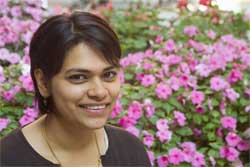Telling Stories: Lalitha Vasudevan
LALITHA VASUDEVAN
BACKGROUND: A B.A. in Psychology in 1997 and a Ph.D. in Education in 2004 from the University of Pennsylvania.
DISSERTATION STUDY: In her study, "Telling different stories differently: The possibilities of multimodal (counter) storytelling with African American adolescent boys," Vasudevan collaborated with five African-American boys, ages 11 to 13, whom she had met while working at their school. In her year-and-a-half-long study, she examined the way the boys told stories through various means-including interviews and interactions with her, and through audio and video journals that they created.
RATIONALE: "I was interested in the stories they would tell and what new insights into literacy we would gain through the lives of these adolescents," Vasudevan says. In this age of technology, she adds, "literacy is broader than the reading and writing that happens in schools, but is in fact the way we make meaning."
METHODOLOGY: Based on new literacy studies and critical race theory, Vasudevan learned about the boys by becoming a part of their group and interacting with them in their neighborhood. "We went to movies, to a park and moved around the city," she said. Through these interactions, she learned about what was important to the boys, how they made meaning in their lives and how they created their own literacy through the way they told their stories. Vasudevan says she felt it was important that, as a researcher, she was not just taking from the participants through interviews and other research methods, but was also building relationships and giving the boys an opportunity to tell their stories in a new way.
FINDINGS: Vasudevan's findings center around two themes that emerged from the boys' stories. How they played as boys and, through that, made meaning in their lives, and how race came into play in their learning experience. "They felt that [racial differences between the students and teachers] were tied to their teachers' misunderstanding of who they were as boys and as black boys," she explained. "This story carried throughout our time together-their need for recognition and their desire to change relationships that students and teachers have in schools."
THE NEXT STEP: Vasudevan, who also works in teacher professional development, hopes her study will show teachers that "the way we make meaning has changed, and schools have not caught up." She adds that while traditional literacy practices are important, they should not exclude engaging students in the expression of their own stories.
At TC, she is setting up a study to explore the stories of young people who are involved in both the justice and education systems, and she will teach a class in the spring about literacy, media and technology in relation to urban youth culture.
Published Tuesday, Oct. 12, 2004
